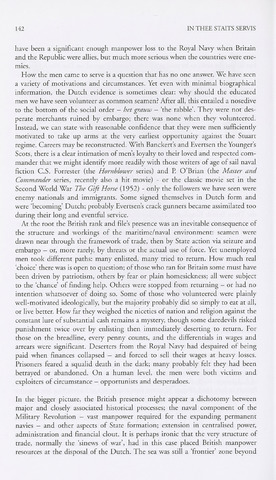142
IN THEE STMTS SERVIS
have been a significant enough manpower loss to the Royal Navy when Britain
and the Republic were allies, but much more serious when the countries were ene
mies.
How the men came to serve is a question that has no one answer. We have seen
a variety of motivations and circumstances. Yet even with minimal biographical
information, the Dutch evidence is sometimes clear: why should the educated
men we have seen volunteer as common seamen? After all, this entailed a nosedive
to the bottom of the social order - het grauw - 'the rabble'. They were not des
perate merchants ruined by embargo; there was none when they volunteered.
Instead, we can state with reasonable confidence that they were men sufficiently
motivated to take up arms at the very earliest opportunity against the Stuart
regime. Careers may be reconstructed. With Banckert's and Evertsen the Younger's
Scots, there is a clear intimation of men's loyalty to their loved and respected com
mander that we might identify more readily with those writers of age of sail naval
fiction C.S. Forrester (the Hornblower series) and P. O'Brian (the Master and
Commander series, recently also a hit movie) - or the classic movie set in the
Second World War The Gift Horse (1952) - only the followers we have seen were
enemy nationals and immigrants. Some signed themselves in Dutch form and
were 'becoming' Dutch; probably Evertsen's crack gunners became assimilated too
during their long and eventful service.
At the root the British rank and file's presence was an inevitable consequence of
the structure and workings of the maritime/naval environment: seamen were
drawn near through the framework of trade, then by State action via seizure and
embargo or, more rarely, by threats or the actual use of force. Yet unemployed
men took different paths: many enlisted, many tried to return. How much real
'choice' there was is open to question; of those who ran for Britain some must have
been driven by patriotism, others by fear or plain homesickness; all were subject
to the 'chance' of finding help. Others were stopped from returning - or had no
intention whatsoever of doing so. Some of those who volunteered were plainly
well-motivated ideologically, but the majority probably did so simply to eat at all,
or live better. How far they weighed the niceties of nation and religion against the
constant lure of substantial cash remains a mystery, though some daredevils risked
punishment twice over by enlisting then immediately deserting to return. For
those on the breadline, every penny counts, and the differentials in wages and
arrears were significant. Deserters from the Royal Navy had despaired of being
paid when finances collapsed - and forced to sell their wages at heavy losses.
Prisoners feared a squalid death in the dark; many probably felt they had been
betrayed or abandoned. On a human level, the men were both victims and
exploiters of circumstance - opportunists and desperadoes.
In the bigger picture, the British presence might appear a dichotomy between
major and closely associated historical processes; the naval component of the
Military Revolution - vast manpower required for the expanding permanent
navies and other aspects of State formation; extension in centralised power,
administration and financial clout. It is perhaps ironic that the very structure of
trade, normally the 'sinews of war', had in this case placed British manpower
resources at the disposal of the Dutch. The sea was still a 'frontier' zone beyond

